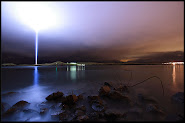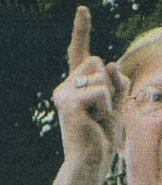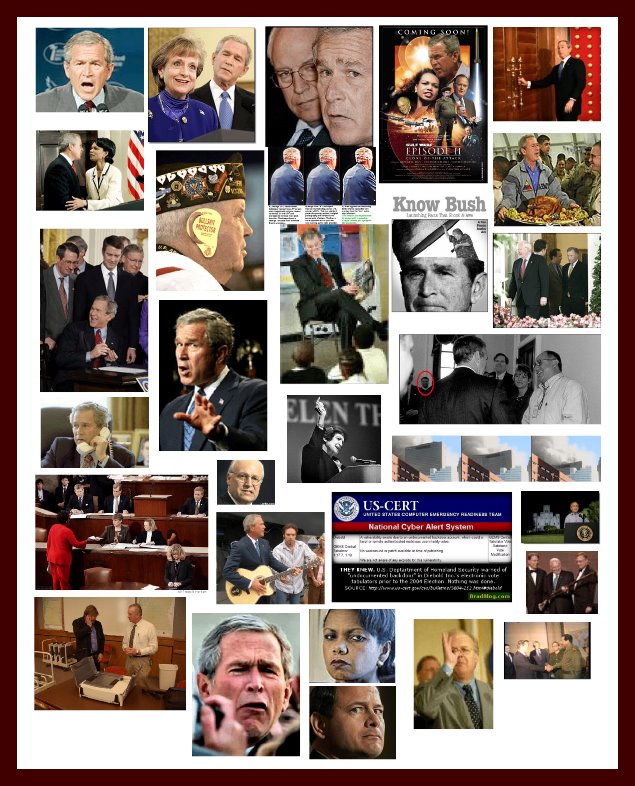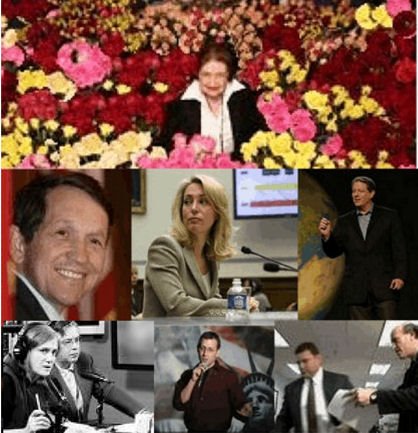For I am a One-Breasted Woman. An Amazon who sacrifices her breast for a higher purpose. One who refuses to wear a phony bag or strange, surgically-implanted, tissue to make a facade of symmetry -for my real symmetry had to shift. And out of that shift poured the determination to live more fully, say what I know, and shed light on lies and hypocrisy.
Since my mastectomy, I have written a book of poetry/monologues on my breast cancer experience called One, A Perfect Imbalance, and Strides: Lessons I Learned While Riding Horses (both unpublished), I have returned to theatre after a 26-year gap, and appeared on many stages inUtah (including The Vagina Monologues and Nickel and Dimed, based on the Barbara Ehrenreich book), I have written the Know Bush emails, eventually circulating to an address list of almost 5,000 and beyond, and wrote and performed on stage Know Bush: Launching Facts That Shock and Awe, A One Person Patriot Act, both in 2004; I have created a website where I've posted more articles, and I've become a "Trusted Author" at OpEdNews.com. I have gone to New York City twice, and I have seen 6 Broadway shows. I have even seen my daughter onstage, dancing and singing, on the stage with the freshly-Tony-awarded revival cast of Hair.
This daughter, who was five when the breast cancer was diagnosed, is now 18, and is brilliant, compassionate, and inspired by my bold, outspoken ways.
I have lived life more vitally. For me, the breast was certainly worth it.
So I am furious at the discussions I've heard this week about mammograms. How dare they tell us to endanger the lives of women in their forties! What about the repercussions on their children?! They make it sound like the anxiety of false positives isn't worth it. But they offer NOTHING! They've even taken away self-examination.
Even while we live in a world that's been further contaminated by such carelessness and lies as the filth from mountaintop-removal sludge, overpopulated livestock production and slaughter,cell phoneradiowaves, nuclear waste, and vaporized depleted uranium particles from military strikes eternally circulating through air currents, water and soil. . .
The dangers of cancer are cancer are increasing, even when we are blind to it, and we must be able to respond, to detect it, and stop it from striking the vital organs. I have always said that breast cancer should be easy. It's a sack outside the main frame and can be removed, taking the cancer with it. But now they are limiting our ability to detect it. They offer no solutions. It makes me snarl.
In an effort to make sense of this – for my friends, for my daughter (who now bears the weight of family history) and stepdaughters - I sought out the advice of someone I trusted, someone who also forced me to rethink mammograms: Devra Davis, the Director of the Center for Environmental Oncology at the University of Pittsburgh Cancer Institute and author of The Secret History of the War on Cancer.
Dear Dr. Davis:
According to my Google search, you have not yet posted a response to the recent announcement about the recommendations for mammograms.
In 1997, at the age of 45, I found a large lump that had suddenly appeared on my left breast. A mammogram followed, as well as an ultrasound, and a lumpectomy. There was calcification in the ducts and the surgeon could get no clean margins. I found a woman oncologist at the University of Utah, who took a great deal of time with me to explain things, and with my only a child, my daughter, only 5 years old, I went ahead and had the recommended mastectomy. While the 12 lymph nodes they removed were clean, it was found that the ducts had been breeched and the cancer was no longer just "in situ", so I also underwent chemotherapy. Again I returned to the woman oncologist, as the young male doctor that I was assigned bluntly told me I had to have heavy-duty chemo with a port and the hair loss, etc. The woman, Dr. Sondra Buys, now at the Huntsman Cancer Institute (still U of U), took an hour with me and carefully wrote down 4 options, narrowed it to 2, and let me choose, then affirmed she would have made the same decision. I stayed with her and got a lighter chemo, one that was much safer for my heart, and without the hair loss.
There has been no reoccurrence, and my daughter is now a student herself at the University of Utah, while I have done so much more with my life since then than I may have done without the urgency the cancer-scare brought to my life.
Meanwhile, I have had two friends die of breast cancer that was found while they were in their forties, and another whose breast cancer has metastasized, with a tumor now growing on her spine.
Naturally, I have believed that I am alive because we stopped the cancer in an early stage.
So I spent years encouraging mammograms and pointing out the statistic I'd read that 75% of breast cancer victims do not have it running in the family.
Then I read your book. I stopped encouraging mammograms because of what you said about the radiation. I also stopped talking about breast cancer. I didn't know what to say.
Then came the announcements this week. They made me angry -- because so little was said about the radiation being the legitimate reason to cut back, and so much was said about the anxiety of false positives, and the impracticality of only saving one life for every 1900 mammograms. And nothing was said about the devastation of children losing their mothers. Nor did I hear discussion about educating the public more about the risk factors other than family history (like alcohol useor carrying extra weight), or what other options there might be (and I listen to NPR almost all day at my job).
I did hear that health insurance companies might use this as a way to stop paying for mammograms. I also heard Democratic Senator Dick Durbin say that this was a panel put together by the Bush administration (and I am extremely aware of the deadly dismissing and/or censoring of scientific evidence done by Bush/Cheney and the corporate lobbyists brought in to wreak havoc throughout federal agencies, and have written about it myself), implying the timing of the release was chosen to further frighten the public and Congress about health care reform.
So, Dr. Davis, I am turning to you. As I Googled, I looked for other options for detecting early breast cancer, and I discovered that just days before the USPSTF recommendations were announced, the Barbara Ann Karmanos Cancer Institute revealed a new breast cancer screening device, called SoftVue, which uses sonic signals, rather than radiation, and is supposed to be more accurate, less expensive, and, most important, less invasive, than current technology.
Is this the solution? I looked in the index of your book for the two doctors mentioned in the announcement, Ann G. Schwartz, and Peter J. Littrup, but they weren't there.
What are women supposed to do?
Thank you so much for your work and courageous writing and public statements. I look forward to your response.
Barbara Bellows-TerraNova
Meanwhile, until I get a reply, dear readers, ASK QUESTIONS. I will return to this when I know more.

















